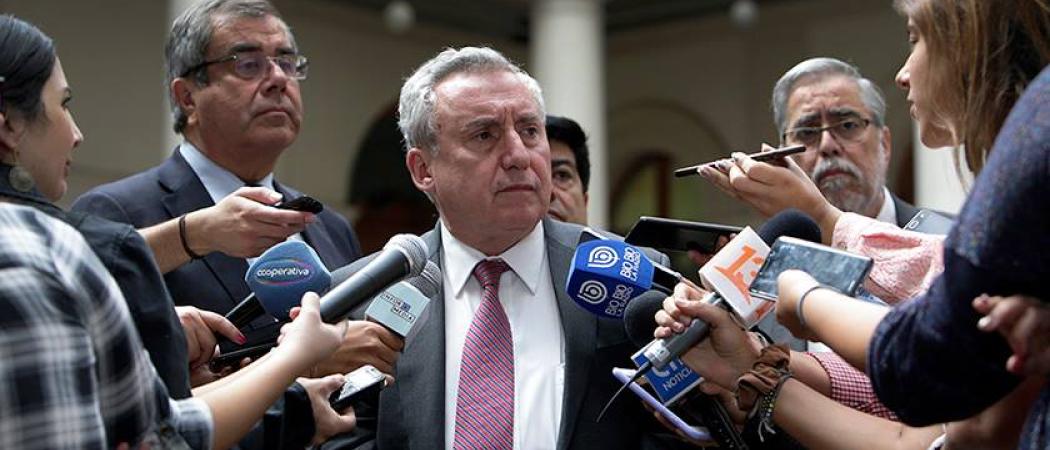As he fights to keep his university from falling to protesters, Ennio Vivaldi, alongside colleagues, is using research to expose police brutality and lay the ground for a new constitution

Ennio Vivaldi. Photo: University of Chile
Chile is in the grip of the largest and most violent demonstration the country has seen since the return of democracy 30 years ago and its oldest academic institute, the University of Chile, has not escaped the rage.
On Thursday last week, a group of students took over one of the university’s main buildings, located close to the presidential palace in the capital, Santiago. It is the latest flashpoint in the midst of the increasingly violent protests that have divided the whole country for over a month.
The university’s rector, Ennio Vivaldi, spent last Thursday negotiating with the protestors to leave.
“I was doing my best to convince them to step out, and make sure no one got hurt,” Vivaldi told Science|Business. “I hope the student body will convince them to leave so the university can work normally again.”
But what constitutes normality for Chile these days is nationwide unrest. “Things are out of control for a while now,” the rector said.
The demonstrations, which have snarled transport and forced the closing of schools and businesses, originally flared over a fare increase on Santiago’s metro. But they quickly spread across the country and widened into deeper grievances against high levels of inequality, the high price of health care and poor funding for education.
The scope and size of the backlash has taken everyone by surprise, Vivaldi said. “It all looked like a very stable society not so long ago. But there was a huge, hidden rage. We’re paying the price for an extreme model of society and economy.”
Twenty-two people are dead, and more than 2,200 have been injured, including 285 people who have either lost their eyesight or suffered severe eye trauma from the rubber bullets, pellets, and tear-gas bombs fired by state police at protesters.
Vivaldi says the reports of police brutality are “terrible”. Public prosecutors are also investigating hundreds of cases of alleged abuses by the police, including torture and sexual violence.
After a student lost an eye from a rubber bullet, an analysis by the university’s engineering school found the bullets were only 20 per cent rubber and 80 per cent other denser components, including lead.
“Because of our report, eye traumas have disappeared in the last few days. The university has played a key role in standing up for human rights,” Vivaldi said.
Transforming Chile
The university has become a hive for debating Chile’s future, with Vivaldi and his staff holding regular discussions on transforming social care and healthcare. Many in the country of 18 million people are pushing for a new constitution to replace the current one, which was fashioned by the harsh Pinochet dictatorship. The main political parties are now expected to hold a referendum in April next year.
Vivaldi says he remains undaunted by the state of things. “There’s no hiding from it. You have to rise up to meet the occasion,” he said.
The university will “never be in favour of, or in opposition to, any government; we’re not on the chess board to attack or defend.”
But he notes that distrust among ordinary Chileans for the rich, ruling elite has been growing, and that the early reaction of the centre-right Piñera government to the protests confirmed many peoples’ worst feelings about those in power.
“There was one minister who, after the rise in metro fare price, said people could just get up earlier in the morning to avoid the higher charges. That tells you a lot – the poor can take a bigger burden, seemed to be the attitude.”
“Another minister [speaking more generally about the state of the country] said that the long waiting times for public health services reflect the fact that [doctor’s surgeries] are ‘popular places to exchange ideas’”.
Vivaldi says that many Chileans feel caught in a cycle of poverty and marginalisation. The economy, which in the past has benefited from commodity price booms for copper, needs to evolve, he says.
“I hope the way the state prioritises research and innovation changes. If you want to go towards a society of knowledge, there has to be more money for research.”
The rector says you can find “certain prejudices” in Chile when it comes to state involvement in the economy. “The private health system here is extremely well to do. But when you say you need money for the university hospital, you’ll be insulted, some will call you a ‘pinko’.
“This thinking risks killing the hen that lays the golden eggs. We’re providing the private sector with [trained] specialists,” he said.
Change at the university
Does Vivaldi think his university needs to change too? “To some degree. I’m not thinking so much about changing the curricula – rather, I’m thinking about how we can provide advice to reform the system; what we might need in a new constitution.
“I take pride in being the head of a pluralist university. I’m not trying to be defensive, but we have kept our doors open to low income families. We’re making a big effort on this – 40 per cent of our students come from the lowest income groups. If we let the market dominate, we’d only have 10-15 per cent of our intake from this group.”
But in any university, “you see a reflection of society,” he said. Students are alienated from the political system. So are staff – “certainly you will find many professors among the protesters.”
“Student identity has changed. You see a reluctance to participate in campus elections, for example. The parties have very little influence anymore on students, which is totally different compared to the situation when I was at school. The political system today is alien to students.”
Chileans need to take a broader view on what kind of education the population needs, he also suggests.
Getting money for the arts and humanities is “tremendously difficult; the country is much more interested in subjects that might be productive for the economy,” he said.
Chile’s universities remain in the good graces of the population. “The opinion of the armed forces, the police and congress on the other hand is extremely low. That’s very dangerous.”
The university ranks among the top institutes in Latin America. That is a significant achievement, the rector says, given, “The country’s budget for education and research is less than one-fourth that of Brazil’s.”
Transforming public anger
Vivaldi believes the huge unrest will leave his country permanently changed. “I would sincerely hope and expect the overall social system, with its extreme individualism and [scorn] for solidarity, changes,” he said. “For now, though, it’s difficult to see how it’s going to calm down.”
Chile’s economy and infrastructure are suffering greatly. Building after building in the centre of Santiago has been ransacked and plastered with graffiti and slogans.
“No one knows how much working time has been lost. And then there’s all the [damaged] bus stops, all the metro stations,” he said. The turmoil has also led to a change in venue for a global climate summit scheduled for December in Santiago to Madrid.
Vivaldi is concerned about where all the rage will ultimately lead. “I wish we could find a way to bring peace to the situation. But how are we going to channel all this energy into something useful? It’s not like putting gas into a motor, where you know the outcome. How we can make sure all this energy goes into something constructive, I don’t know,” he said.





 A unique international forum for public research organisations and companies to connect their external engagement with strategic interests around their R&D system.
A unique international forum for public research organisations and companies to connect their external engagement with strategic interests around their R&D system.